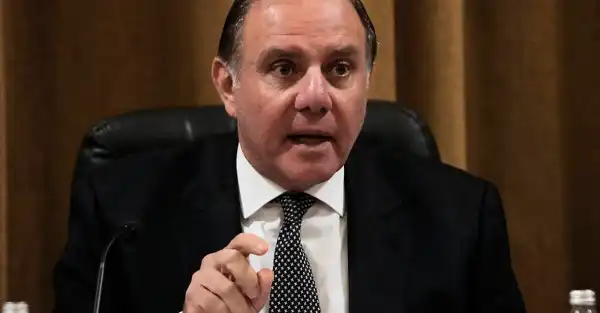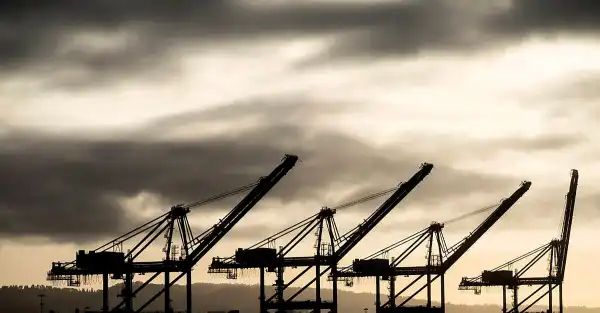
As international support for Ukraine loses momentum, Germany keeps refusing to deliver high-tech tanks to Ukraine and bets on “swap exchanges” with Eastern European countries to assist the war-torn country.
German chancellor Olaf Scholz justified the approach by stating that decisions were taken in close consultation with its transatlantic allies.
“It is a leadership decision we have made together that we do not go it alone, but always work with our allies,” he said during his Bundestag address on Wednesday (6 July).
Scholz instead bets on the so-called “chain swap,” where eastern European member states deliver their soviet tanks to Ukraine in exchange for “modernised weapons from German stocks.”
After initial delays in providing these weapons to Eastern EU partners, Scholz announced that the shipment would be imminent. “We have invested a great deal of energy in making sure that happens,” he said.
While Scholz justified his refusal to ship high-tech tanks to Ukraine directly by stating that he did not want to deviate from the West’s approach, Spain is currently considering whether to send Leopard tanks to Ukraine.
According to information obtained by Business Insider, a Ukrainian delegation is currently in Spain to inspect the tanks.
However, even if Madrid greenlights the deal, Germany would still have the final say on the delivery of the tanks. As the tanks were originally produced in Germany, the government has a veto on the shipment to third countries.
Germany’s biggest weapons supplier Rheinmetall also recently announced that it could deliver around 100 Marder tanks and almost 90 Leopard I tanks to Ukraine in the foreseeable future as well. A dozen of these tanks are ready for shipment right now.
Declining support for Ukraine
Meanwhile, the momentum for further commitment to Ukraine is slowing down considerably, a report by the Kiel Institute for the World Economy, updated on Wednesday, found.
While Ukraine is heading towards a critical phase in its fight for the Donbas, almost no additional pledges have been made in recent weeks. The total commitment to Ukraine amounts to €80.7 billion, but the global community pledged only around €2.5 billion between 8 June and 1 July.
While chancellor Scholz stated that his government has mobilised “a lot of support for Ukraine,” Germany is only ranked in 13th place regarding commitment to Ukraine in relation to GDP – behind France, Denmark and Portugal.
However, the EU is also lagging, with the US continuing to take the lead in support. While the EU institutions and member states combined have pledged €27.7 billion so far, the Biden administration has committed almost €43 billion in the same time frame – more than half of the total commitments of the international community.
EU hesitant to pledge money to Ukraine’s recovery
The question of financial assistance for Ukraine has also been on the agenda earlier this week.
On Monday (4 July) and Tuesday, representatives of Ukraine, Europe, the US, Canada, Japan and other countries met in the Swiss city of Lugano to discuss how to help Ukraine recover from the devastation of the war.
“The reconstruction of Ukraine is not a local project, not a project of one nation, but a joint task of the entire democratic world,” Ukrainian President Volodymyr Zelenskyy said, addressing the gathered representatives via video call.
Ukrainian Prime Minister Denys Shmyhal said the reconstruction would cost about $750 billion and urged the reconstruction efforts to start as soon as possible.
“There is no water in the liberated Chernihiv – it is vitally important to repair the water main right here and right now,” he said.
In May, the EU Commission proposed establishing a reconstruction platform led by the Ukrainian government and the EU Commission. However, the Commission has not yet tabled a specific proposal for financing this.
In Lugano, Commission President Ursula von der Leyen did not provide any further details either and announced that she would organise another donor conference with German Chancellor Scholz later this year.
The participants of the Lugano conference signed a joint declaration and agreed on the ‘Lugano principles’ that the recovery process should follow. The principles lay out that, while supported by international partners, the recovery process should be led by Ukraine and focused on reforms, inclusion, and sustainability.
Meanwhile, the European Investment Bank (EIB) announced the creation of a “EU-Ukraine Gateway Trust Fund” that should help direct public and private investment toward the reconstruction of Ukraine through loan guarantees. In this way, the EIB hopes to mobilise up to €100 billion in investments in Ukraine.
[Edited by Alice Taylor]
Source: euractiv.com



